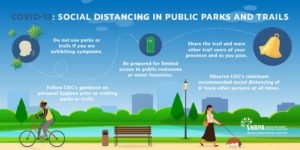Resources for Outdoor Enthusiasts
The month of March has finally come to an end, and now we Michiganders are faced with what looks to be a long April ahead as the global coronavirus pandemic continues. With this in mind, many folks are looking for ways to connect with nature responsibly.
Several conservation organizations are producing excellent resources for folks to use during this pandemic. For example, Heart of the Lakes has created a wonderful Social-Distancing Adventure Hub with plenty of activities and articles to keep outdoor enthusiasts busy and well informed. For parents who are looking for some homeschooling activities, the National Wildlife Federation has released several lesson plans for free on their website . Another great resource for folks during this pandemic is the Michigan Out-of-Doors Podcast , in which you can learn more about how Michigan United Conservation Clubs unites citizens to conserve, protect and enhance Michigan’s natural resources and outdoor heritage.
All of the aforementioned resources are great tools to find ways to explore the out-of-doors responsibly. Out of the window of my home workspace, I have noticed an increase in folks getting outside on walks, bicycle rides, and even a few climbing trees. I am happy to see so many folks getting outside, but as the Michigan “shelter in place” executive order is in place, and the global coronavirus pandemic continues, it is critically important to take precautions and follow social distancing guidance while utilizing public outdoor spaces.
The Michigan Department of Natural Resources (MDNR) has released the following guidelines for those going and utilizing public lands.
- Go out only if you’re feeling healthy.
- Long-distance travel is discouraged unless it is essential.
- Individuals must maintain a minimum of 6 feet between themselves and any people of other households. Anyone not following the social-distancing requirement may face misdemeanor violation/arrest penalties, including up to 90 days in jail and/or a fine up to $500.
- Wash hands often with soap and warm water for 20 seconds. If those aren’t available, use a hand sanitizer containing at least 60% alcohol.
- When driving, keep windows slightly open to provide airflow. Do not drive with people who do not live in your household.
- If the parking is full when attempting to visit a park, recreation area, boating access site or trailhead, leave and choose a different location.
Protecting the health of other Michiganders and preventing the spread of the COVID-19 virus, should be the fundamental factor in how we connect with nature for the foreseeable future.

The post Resources for Outdoor Enthusiasts appeared first on Michigan United Conservation Clubs.
Recent Posts



